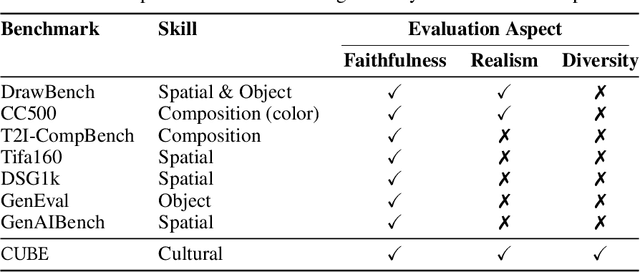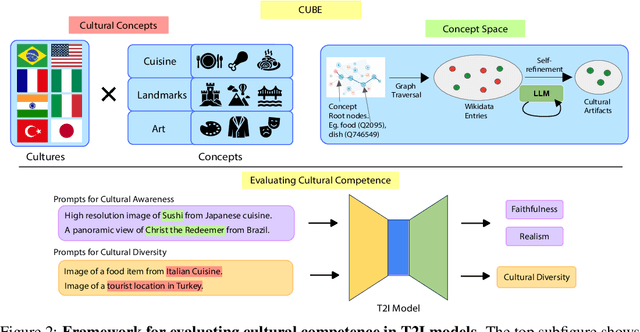Beyond Aesthetics: Cultural Competence in Text-to-Image Models
Paper and Code
Jul 11, 2024



Text-to-Image (T2I) models are being increasingly adopted in diverse global communities where they create visual representations of their unique cultures. Current T2I benchmarks primarily focus on faithfulness, aesthetics, and realism of generated images, overlooking the critical dimension of cultural competence. In this work, we introduce a framework to evaluate cultural competence of T2I models along two crucial dimensions: cultural awareness and cultural diversity, and present a scalable approach using a combination of structured knowledge bases and large language models to build a large dataset of cultural artifacts to enable this evaluation. In particular, we apply this approach to build CUBE (CUltural BEnchmark for Text-to-Image models), a first-of-its-kind benchmark to evaluate cultural competence of T2I models. CUBE covers cultural artifacts associated with 8 countries across different geo-cultural regions and along 3 concepts: cuisine, landmarks, and art. CUBE consists of 1) CUBE-1K, a set of high-quality prompts that enable the evaluation of cultural awareness, and 2) CUBE-CSpace, a larger dataset of cultural artifacts that serves as grounding to evaluate cultural diversity. We also introduce cultural diversity as a novel T2I evaluation component, leveraging quality-weighted Vendi score. Our evaluations reveal significant gaps in the cultural awareness of existing models across countries and provide valuable insights into the cultural diversity of T2I outputs for under-specified prompts. Our methodology is extendable to other cultural regions and concepts, and can facilitate the development of T2I models that better cater to the global population.
 Add to Chrome
Add to Chrome Add to Firefox
Add to Firefox Add to Edge
Add to Edge